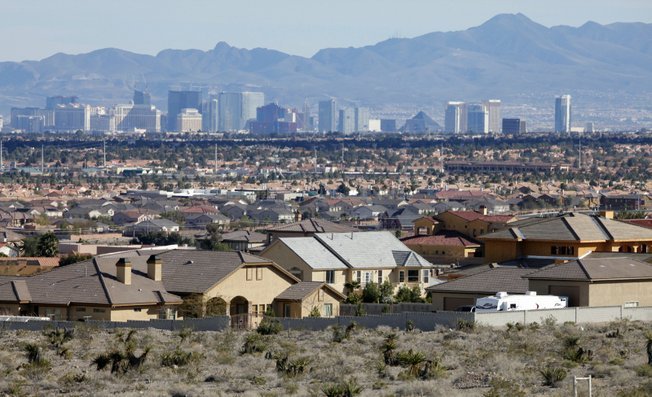
Sun file
In the Las Vegas metropolitan area, the homeownership rate for Blacks was 28% in 2019, according to the U.S. Census Bureau, about 33 points lower than that of the area’s white population.
Monday, Dec. 13, 2021 | 2 a.m.
Shanta Patton-Golar knows a 10-year goal is something to take on in bite-sized portions.
That’s how she has approached the Make Homes Possible program, which is powered by a coalition of Las Vegas organizations and community leaders who want to help lead 25,000 Black families into homeownership in the next decade.
Backed by Homie, a tech-based Utah real estate company with a large presence in Las Vegas, the program, nearly a year old, has helped place close to two dozen valley families in homes so far.
There’s plenty more left for the coalition to accomplish, but Patton-Golar said it’s a start.
When Homie went to state officials last year with an interest in putting forth a program like Make Homes Possible, Patton-Golar was tapped to help lead the coalition.
A real estate agent and certified U.S. Department of Housing and Urban Development housing counselor, Patton-Golar has served as a regional vice president for the National Association of Real Estate Brokers, a minority trade organization.
She said many obstacles — some of them institutional, such as the availability of credit and the small number of Black and female appraisers — stand in the way of Black homeownership, but she’s hopeful things will change.
“When we see people of color having their homeownership numbers go down but white homeownership numbers aren’t going down, that’s a conversation that needs to happen,” Patton-Golar said.
According to the U.S. Census Bureau, the homeownership rate for Black Americans, as of earlier this year, was 45%, nearly 30 percentage points lower than the rate for white citizens.
In the Las Vegas metropolitan area, the homeownership rate for Blacks was 28% in 2019, according to the bureau, about 33 points lower than that of the area’s white population.
The onset of the pandemic last year — and the steep rise in home prices that followed — have likely extended that gap in Las Vegas, Patton-Golar said.
“We’re struggling to catch back up to where we were,” Patton-Golar said. “It takes boots on the ground to make a program like this work. Based on the research we have, the biggest reason why Blacks don’t own their own homes is a lack of education and the misinformation out there about homeownership.”
On Wednesday, Patton-Golar helped lead a webinar for those interested in homeownership.
The event — a similar in-person session will take place in January — showcased some of the coalition’s success stories.
One of those stories is that of Las Vegas resident Kristopher Leonard, who closed on a home about a year ago.
Leonard rented for about a decade and was laid off from his job during the pandemic. But he was able to improve his credit score and save money over time, aided by a housing counselor, to eventually become a homeowner.
He then welcomed his mother, Kim Leonard, to live in his home.
“We had people leading us and telling us what we had to do,” Kim Leonard said. “The pandemic was a setback when (Kristopher) lost his job, but it all worked out for the best. To have a housing counselor, it makes all the difference in the world.”
Patton-Golar said housing counselors can serve as “hand-holders” through what can be a complicated process, especially for first-time homebuyers.
“I understand the barriers that exist that keep Blacks from owning homes,” Patton-Golar said. “We wanted to be in front of people one person at a time. We’ve counseled hundreds of people so far. Our numbers are small now, but that’s because we’re gearing people up to put them in the homeownership pipeline.”
Though she sells homes for a living, Patton-Golar offers her housing counseling services at no cost.
The high cost of homes in Southern Nevada — the median price for an existing home was $420,000 last month, an all-time high — makes it more challenging to get people into homes, Patton-Golar said. But there are still affordable starter homes out there, she said.
As of early this month, the coalition has enrolled about 2,500 students in its “master class” educational series. In the past year, more than 500 housing counseling appointments have been made.
Partners within the coalition include the city of Las Vegas, the Las Vegas Urban Chamber of Commerce, the Nevada Housing Division and the National Association of Real Estate Brokers, among others.
“In Las Vegas, there’s a serious lack of knowledge on these issues,” Patton-Golar said. “A lot of times in the Black community, you have been mentally tailored to understand that if it’s not specifically for Black people, it’s not yours. When we did our branding, we were very clear that this is for Black home ownership. We’ve seen a bigger turnout because of that.”
